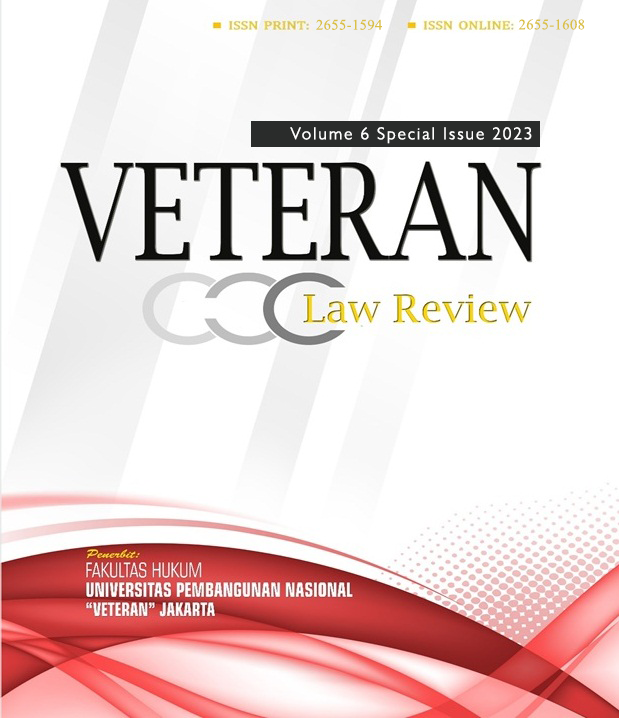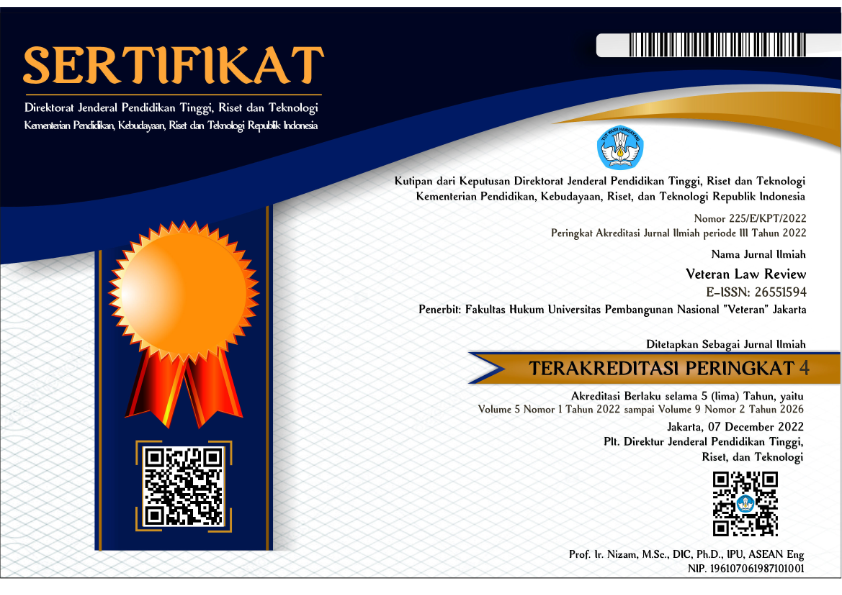Digitalization of Evidence in the Constitutional Court: Opportunities and Requisite
DOI:
https://doi.org/10.35586/velrev.v6iSpecialIssues.4791Abstract
Digitization has spread to people's live, it is also necessary to reform the judiciary for the efficiency and effectiveness of evidence in procedural law. Legalization rather than the use of digitalized evidence is also needed for legal certainty in proceedings. The research method used in this study is a normative legal method with a historical approach and statutory approach. The historical approach is used to analyze the background of constitutional cases in the past and is connected to current conditions related to evidence. A statutory approach is needed to analyze the legality of using digital evidence when taking proceedings at the Constitutional Court. The results of this study are found that the history of constitutional cases that have relevance to the existence of the Constitutional Court is the background for the occurrence of evidence in the institution that guards the constitution. The use of digital evidence has proven necessary to realize the principle of fast, easy and cheap process. In addition, its practical use is only limited to the administrative affairs of the court clerks, not to the evidentiary process in the Procedural Law of the Constitutional Court. So that it is necessary to adapt the court to digitalization to get to the proof stage by carrying out legal formulations in the form of changes to the procedural law of the Constitutional Court which will provide space for evidence in digital form in proceedings at the Constitutional Court.
Downloads
References
Abubakar, R. (2021). Pengantar Metodologi Penelitian. Yogyakarta: SUKA-Press.
Al Araf Assadallah Marzuki, S. H. (2020). Penguatan Demokrasi Cyber di Indonesia Pasca Pemilu 2019. Masyarakat Indonesia, 45(1), 33-46.
Ali, M. M. (2016). Konstitusionalitas dan Legalitas Norma dalam Pengujian Undang-Undang Terhadap Undang-Undang Dasar 1945. Jurnal Konstitusi, 12(1), 172-195.
Ambarsari, R. (2022). Hukum Acara dalam Pengujian Undang-Undang di Indonesia. Cerdika: Jurnal Ilmiah Indonesia, 2(5), 607-613.
Andalas, P. S. K. F. (2016). Perkembangan pengujian perundang-undangan di Mahkamah Konstitusi. Jurnal Konstitusi, 7(6), 147-224.
Anggono, B. D. (2016). Konstitusionalitas dan Model Pendidikan Karakter Bangsa Pasca Putusan Mahkamah Konstitusi. Jurnal Konstitusi, 11(3), 492-514.
Araújo, L. H. D. (2020). Constitutional Law around the globe: judicial review in the United States and The “Writ of Certiorari”. Revista de Investigações Constitucionais, 7, 189-204.
Asshiddiqie, J. (2006). Pengantar Hukum Tata Negara Jilid I. Jakarta: Sekretariat jenderal dan Kepaniteraan Mahkamah Konstitusi Republik Indonesia.
Bawembang, N. (2019). Beban Pembuktian dan Alat Bukti dalam Hukum Acara Mahkamah Konstitusi. Lex Administratum, 7(4), 61-70.
Borman, M. S. (2017). Independensi Kekuasaan Kehakiman dari Pengaruh Kekuasaan di Indonesia. Lex Journal: Kajian Hukum & Keadilan, 1(1).
Chandranegara, I. S. (2021, August). Alternative Scenarios for The Quasi-Judicial Administration to Provide Access to Justice under Public Health Emergencies. In International Conference on Economics, Business, Social, and Humanities (ICEBSH 2021) (pp. 511-516).
Darmadi, N. S. (2020). Kedudukan dan Wewenang Mahkamah Konstitusi dalam Sistem Hukum Ketatanegaraan Indonesia. Jurnal Hukum, 28(2), 1088-1108.
Doni Silalahi, S. A. (2016). Kewenangan Yudisial Review Mahkamah Agung Terhadap Peraturan Perundang-Undangan di Bawah Undang-Undang. Jurnal Nestor Magister Hukum, 3(3).
Driesen, D. M. (2020). The Unitary Executive Theory in Comparative Context. Hastings LJ, 72, 1.
Engel, G. (2020). Power to the People: The Supreme Court's Confirmation of State Power in the Wake of Faithless Electors. U. Miami L. Rev., 75, 620.
Faiz, P. M. (2017). Memperkuat Prinsip Pemilu yang Teratur, Bebas, dan Adil melalui Pengujian Konstitusionalitas Undang-Undang (Strengthening the Principle of Regular, Free and Fair Elections Through Constitutional Review). Jurnal Konstitusi, 14(3), 672-700.
Faqih, M. (2016). Nilai-Nilai Filosofi Putusan Mahkamah Konstitusi Yang Final dan Mengikat. Jurnal Konstitusi, 7(3), 097-118.
Fatkhurohman & Sjuhad, M. (2010). Memahami Pemberhentian Presiden (Impeachment) di Indonesia (Studi Perbandingan Pemberhentian Presiden Soekarno dan Presiden Abdurrahman Wahid). Jurnal Konstitusi, 3(2), 165-184.
Febriyanti, S. (2022). Analisis Yuridis Penetapan Peraturan Pemerintah Pengganti Undang-Undang (Perppu) Oleh Presiden Berdasarkan Undang-Undang Dasar Negara Republik Indonesia Tahun 1945. Limbago: Journal of Constitutional Law, 2(1), 123-135.
Fudin, H. (2021). Legal Justice in Presidential Impeachment Practice Between Indonesia and the United States of America. Jurnal Hukum dan Peradilan, 9(3), 465-504.
Gaffar, J. M. (2009). Kedudukan, Fungsi dan Peran Mahkamah Konstitusi dalam Sistem Ketatanegaraan Republik Indonesia. Jurnal Mahkamah Konstitusi, Jakarta.
Hasani, I (Eds). (2013). Dinamika Perlindungan Hak Konstitusional Warga: Mahkamah Konstitusi sebagai Mekanisme Nasional Baru Kemajuan dan Perlindungan HAM. Jakarta: Pustaka Masyarakat Setara.
Hastuti, E., Wantu, F., & Tijow, L. M. (2020). Penyelesaian Disharmoni Peraturan Perundang-Undangan Melalui Mediasi. Gorontalo Law Review, 3(2), 137-152.
Ilham, M.H. (2019). Kajian atas Asas Peradilan Cepat, Sederhana, dan Biaya Ringan Terhadap Pemenuhan Hak pencari Keadilan (Studi Putusan Mahkamah Agung Nomor 246 K/Pid/2017). Jurnal Verstek,7(3), 212-219.
Isra, S. (2015). Titik Singgung Wewenang Mahkamah Agung dengan Mahkamah Konstitusi. Jurnal Hukum dan Peradilan, 4(1), 17-30.
Jamil, J. (2020). Evaluasi Penyelesaian Sengketa Proses Pemilihan Umum dalam Perspektif Konstruksi Hukumnya. Perspektif, 25(1), 12-19.
Johansyah. (2021). Putusan Mahkamah Konstitusi Bersifat Final dan Mengikat (Binding). Solusi, 19(2), 165-182.
Konstitusi, M. (2009). Mengawal Demokrasi Menegakkan Keadilan Substantif. Jakarta: Laporan Tahunan MK.
Librayanto, R., Riza, M., Ashri, M., & Abdullah, K. (2019). Penataan Kewenangan Mahkamah Konstitusi dalam Memperkuat Independensi Kekuasaan Kehakiman. Amanna Gappa, 43-66.
Madalina, M., Laxamana, M. I., & Aldian, K. Penegakan Hukum Progresif Dalam Perkara Judicial Review: Telaah Pancasila Sebagai Batu Uji Pengujian Undang-Undang Terhadap Undang-Undang Dasar. Jurnal Majelis, 1.
Mahkamah Konstitusi Republik Indonesia. (2021). Sejarah dan Perkembangan. Retrieved April 17, 2022, from https://www.mkri.id/index.php?page=web.ProfilMK&id=1&menu=2
Mahkamah Konstitusi Republik Indonesia. (2022). Rekapitulasi Putusan. Retrieved April 10, 2022, from https://www.mkri.id/index.php?page=web.Putusan&id=1&kat=1&menu=5
Muhaimin. (2020). Metode Penelitian Hukum. Mataram: Mataram University Press.
Nugraha, X., Frisa Katherina, A. M., Ramadhanty, S. N., & Tanbun, E. P. (2019). Constitutional Question: Alternatif Baru Pelindungan Hak Konstitusional Warga Negara Melalui Concrete Review di Indonesia (Constitutional Question: Alternatif Baru Pelindungan Hak Konstitusional Warga Negara Melalui Concrete Review di Indonesia). Negara Hukum: Membangun Hukum untuk Keadilan dan Kesejahteraan, 10.
Nurhidayatuloh, N. (2016). Dilema Pengujian Undang-Undang Ratifikasi Oleh Mahkamah Konstitusi Dalam Konteks Ketetanegaraan RI. Jurnal Konstitusi, 9(1), 113-134.
Palguna, I., & Gede, D. (2017). Constitutional Complaint and the Protection of Citizens the Constitutional Rights. Const. Rev., 3, 1.
Peraturan Mahkamah Konstitusi Nomor 2 Tahun 2021 tentang Tata Beracara Dalam Perkara Pengujian Undang-Undang.
Prakash, S. B., & Yoo, J. C. (2003). The Origins of Judicial Review. The University of Chicago Law Review, 70(3), 887-982.
Putri, B.U. (2019). Dokumen Bukti Sengketa Pilpres Prabowo Tak Jadi Sampai 12 Truk. Tempo.co. Retrieved April 13, 2022, from https://nasional.tempo.co/read/1215295/dokumen-bukti-sengketa-pilpres-prabowo-tak-jadi-sampai-12-truk/full&view=ok
Rahman, A. (2016). Impeachment dalam UUD 1945 Pasca Amandemen. Jurnal Hukum Diktum, 14(1), 89-105.
Ramadhan, M. F. (2018). Menggagas Penerapan Constitutional Complaint di Mahkamah Konstitusi. Padjadjaran Law Review, 6.
Sajó, A., & Uitz, R. (2017). The Constitution of Freedom: an Introduction to Legal Constitutionalism. Oxford University Press.
Sekretariat Jenderal dan Kepaniteraan Mahkamah Konstitusi Republik Indonesia. (2010). Hukum Acara Mahkamah Konstitusi. Jakarta: Sekretariat Jenderal dan Kepaniteraan Mahkamah Konstitusi Republik Indonesia.
Siahaan, M. (2006). Hukum Acara Mahkamah Konstitusi Republik Indonesia. Jakarta: Sekretariat Jenderal dan Kepaniteraan Mahkamah Konstitusi RI.
Siahaan, M. (2016). Uji Konstitusionalitas Peraturan Perundang-Undangan Negara Kita: Masalah dan Tantangan. Jurnal Konstitusi, 7(4), 009-048.
Siregar, A. R. M. (2018). Kewenangan Mahkamah Konstitusi Dalam Pengujian Undang-Undang Terhadap Undang-Undang Dasar Tahun 1945. Jurnal Hukum Responsif, 5(5), 100-108.
Soeharno. (2014). Hukum Acara Mahkamah Konstitusi Penegak Hukum dan Pengadilan. Jurnal LPPM Bidang EkoSosBudKum. 1(2), 16.
Sumadi, A. F. (2016). Hukum Acara Mahkamah Konstitusi dalam Teori dan Praktik. Jurnal Konstitusi, 8(6), 849-880.
Sutiyoso, B. (2016). Pembentukan Mahkamah Konstitusi Sebagai Pelaku Kekuasaan Kehakiman di Indonesia. Jurnal Konstitusi, 7(6), 025-050.
Undang-Undang Dasar Negara Republik Indonesia Tahun 1945.
Undang-Undang Nomor 24 Tahun 2003 tentang Mahkamah Konstitusi (Lembaran Negara Republik Indonesia Tahun 2003 Nomor 98, Tambahan Lembaran Negara Republik Indoneia Nomor 4316).
Wajdi, F & Andryan. (2019). Sifat Putusan Mahkamah Konstitusi Terhadap Status Hukum Presiden dan/atau Wakil Presiden. Jurnal Penelitian Hukum, 20(3), 301-314.
Whittington, K. E. (2020). Reconsidering the History of Judicial Review. Constitutional commentary, 35(1), 1-12.
Widiarto, A. E. (2019). Implikasi Hukum Pengaturan Hukum Acara Mahkamah Konstitusi dalam Bentuk Peraturan Mahkamah Konstitusi. Jurnal Konstitusi, 16(1), 23-42.
Winata, M. R. (2020). Judicial Restraint dan Constitutional Interpretation Terhadap Kompetensi Mengadili Pelanggaran Pemilihan Umum Terstruktur, Sistematis, dan Masif. Jurnal Legislasi Indonesia, 17(4), 423-436.
Wiryanto. (2019). Mahkamah Konstitusi dalam Sistem Ketatanegaraan RI (Powerpoint). Pusat Pendidikan Pancasila dan Konstitusi Mahkamah Konstitusi Republik Indonesia. Retrieved April 10, 2022, from https://pusdik.mkri.id/materi/materi_30_MK%20Dalam%20Sistem%20Ketatanegaraan%20RI.pdf
Wrzoszczyk, M. (2019). The Idea of Judicial Review in the United States of America: The Context of Creating and Early Judgments of the Supreme Court. Orbis Idearum, 7(2).
Downloads
Published
How to Cite
Issue
Section
License
Copyright (c) 2023 Veteran Law Review

This work is licensed under a Creative Commons Attribution-ShareAlike 4.0 International License.
Copyright (c) 2022 Veteran Law Review Journal
Veteran Law Review © 2022 by Faculty of Law Universitas Pembangunan Nasional "Veteran" Jakarta is licensed under Creative Commons Attribution 4.0 International

1. License
The non-commercial use of the article will be governed by the Creative Commons Attribution license as currently displayed on Creative Commons Attribution 4.0 International.
2. Author(s)' Warranties
The author warrants that the article is original, written by the stated author(s), has not been published before, contains no unlawful statements, does not infringe the rights of others, is subject to copyright that is vested exclusively in the author, and free of any third party rights, and that any necessary written permissions to quote from other sources have been obtained by the author(s).
3. User/Public Rights
VELREV's spirit is to disseminate articles published are as free as possible. Under the Creative Commons Attribution-ShareAlike 4.0 International License. VELREV permits users to copy, distribute, display, and perform the work for non-commercial purposes only. Users will also need to attribute authors and VELREV to distributing works in the journal and other media of publications.
4. Rights of Authors
Authors retain all their rights to the published works, such as (but not limited to) the following rights;
- Reproduce the work
- Prepare derivative works based upon the work
- Distribute copies of the work
- Perform the work publicly
- Display the work publicly
- Copyright and other proprietary rights relating to the article, such as patent rights,
- The right to self-archive the article,
- The right to enter into separate, additional contractual arrangements for the non-exclusive distribution of the article's published version (e.g., post it to an institutional repository or publish it in a book), with an acknowledgement of its initial publication in this journal (Veteran Law Review).
5. Co-Authorship
If the article was jointly prepared by more than one author, any author submitting the manuscript warrants that he/she has been authorized by all co-authors to be agreed on this copyright and license notice (agreement) on their behalf, and agrees to inform his/her co-authors of the terms of this policy. VELREV will not be held liable for anything that may arise due to the author's internal dispute. VELREV will only communicate with the corresponding author.
6. Royalties
Being an open accessed journal and disseminating articles for free under the Creative Commons license term mentioned, author(s) are aware that VELREV entitles the author(s) to no royalties or other fees.
7. Miscellaneous
VELREV will publish the article (or have it published) in the journal if the article’s editorial process is successfully completed. JOSI's editors may modify the article to a style of punctuation, spelling, capitalization, referencing, and usage that deems appropriate. The author acknowledges that the article may be published so that it will be publicly accessible and such access will be free of charge for the readers as mentioned in point 3.


















